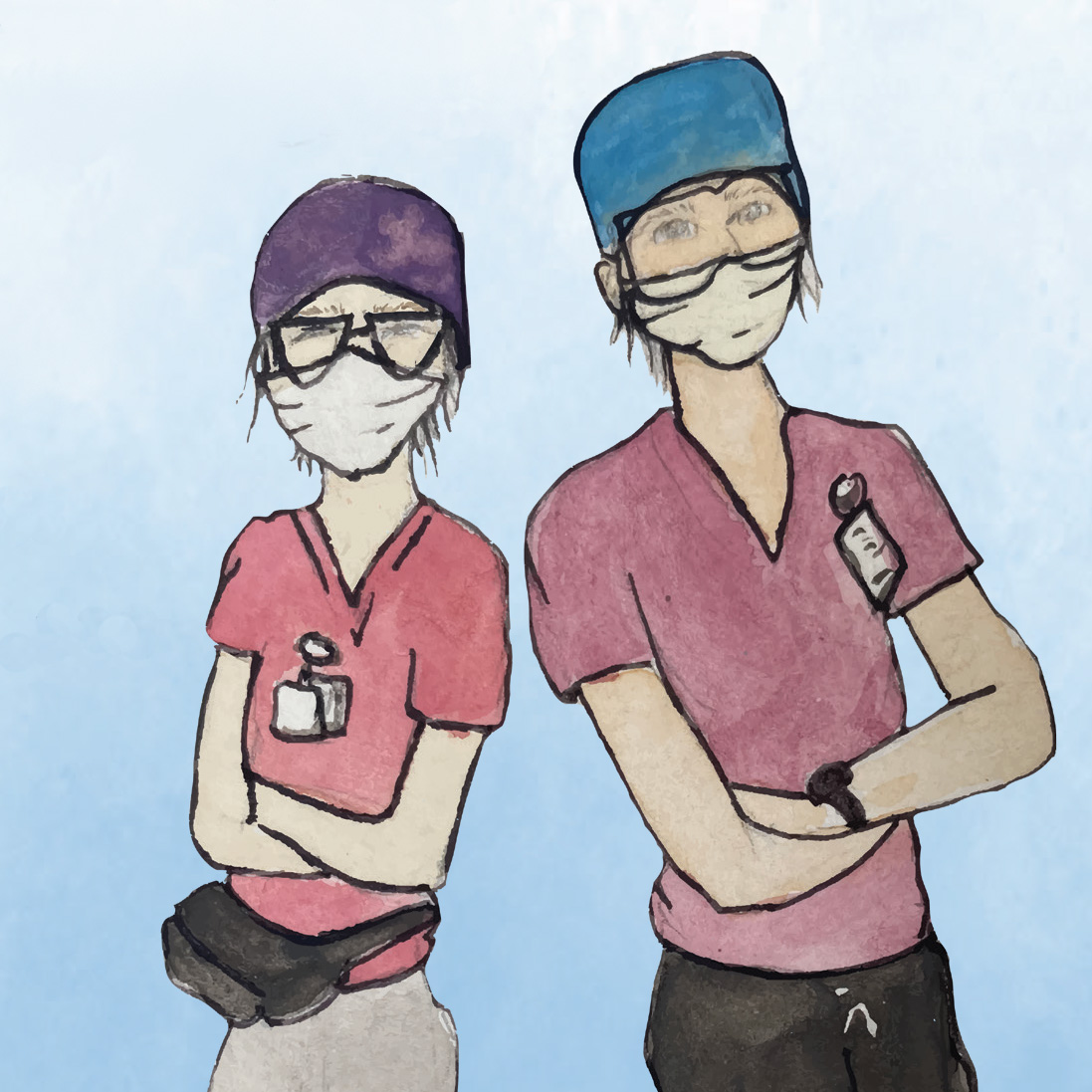03.31.2022
By John Hobbs
Stories from the Frontlines

Recent grads Judy Zhou DPT ’20 and Amanda Pettas DPT ’20 chronicle their experience as frontline workers during the COVID-19 pandemic in their new book, Prone Team.
BY JOHN HOBBS MA ’14
WHEN RECENT GRADUATES Judy Zhou and Amanda Pettas finished their doctor of physical therapy studies at USC, they couldn’t have known what the professional world had in store for them.
Having secured physical therapist positions at a local hospital, their responsibilities suddenly shifted as waves of COVID-19 cases overwhelmed intensive care units, leaving severe staffing shortages and burnout in its wake
Knowing that physical therapists had knowledge of body movement, nursing management tasked them with proning patients (rolling them onto their backs or stomachs) to help improve their oxygen saturation levels — not an easy task considering how many were intubated, with vitals-monitoring lines, IVs and oxygen tubes encompassing them.
In their new role, Zhou and Pettas saw it all: code blues, family members spending precious last moments with loved ones and even the occasional brief moment of celebration, or a “code sunshine,” as they called it.
The two women chronicled their harrowing experiences, which primarily took place from November 2020 to March 2021, in their new book, Prone Team — an easy-to-read collection of short stories.
We asked the alumnae to share a little bit more about their experiences on the front lines.
First off, how does proning help COVID patients?
Judy Zhou: In patients who are intubated and on a ventilator, proning increases lung recruitability, ventilation-perfusion matching and oxygen saturation. In patients who are not intubated but who have low oxygen saturation, proning improves oxygen saturation and subjective reports of dyspnea while decreasing the work of breathing and likelihood of intubation. The ultimate goal, though, is to prevent or reduce patient mortality.
What did you take away from the experience professionally? You had just started your careers and here you are facing a massive catastrophe.
Amanda Pettas: It reinforced the importance of working as a team for the good of the patient. Everyone has something to contribute that is critical to the patient’s care, and it’s all just as important as the next thing. And especially because the patients could not have visitors, we became their family.
Why was it important to you both to share your stories with the world? What do you hope that your readers take away from the book?
JZ: When all this was happening, I would leave the hospital after work and feel like I was stepping into a totally different world, where people were walking down the sidewalk and going about their regular lives. It felt that others were oblivious to our experiences, which became quite lonesome after awhile. We hoped that this book would bring the world closer to us. We also hope that our readers will come away with a higher sense of value for their lives and understand that it’s good to lean on others during hard times.
What did you learn about yourself as a result of this experience?
AP: We are much more resilient than we think. At the same time, we learned how important it is to take care of ourselves in order to take care of others. While we both are very capable of falling on a sword for the good of others, we were much more effective and present if we were able to do something for ourselves outside of work.
In what ways did USC prepare you for this once-in-a-generation (hopefully) pandemic and the work you did on the frontlines?
JZ: While it’s safe to say that nothing didactic could have prepared us for witnessing the sheer number of lives lost, we were well prepared for working as a team with other healthcare providers and putting patients first. Patient care and advocacy were always our number-one priority.
Being surrounded by death all day everyday must have really been difficult. What lessons did that teach you about life in general?
AP: It sounds corny, but the biggest thing is that life really is short, and we have no idea how long we have. The families of these patients dropped them off at the hospital not knowing if they would ever see them again. We truly have to live for the moment and say things we really want to be known because we may not get another chance. Also, it’s important to spend time with friends and family. Work will always be there, but friends and family can never get that time back with us.
Prone Team is available for purchase on Amazon.
ILLUSTRATION: MALLORY PETTAS

